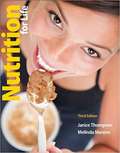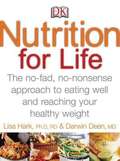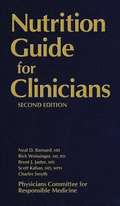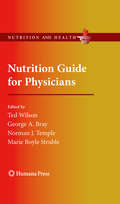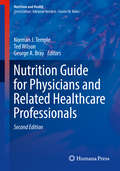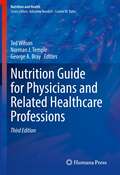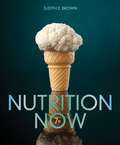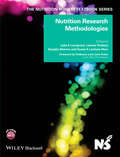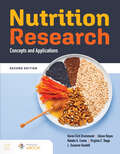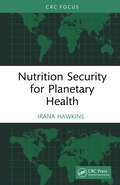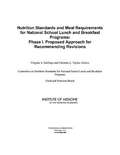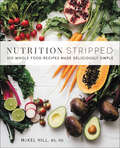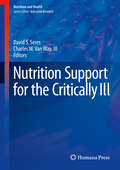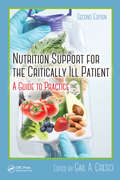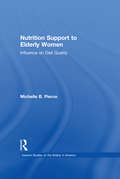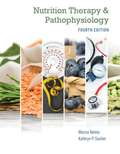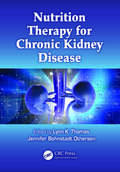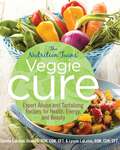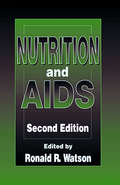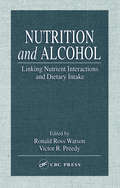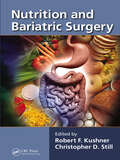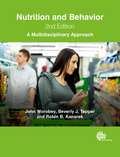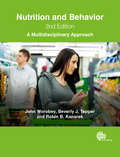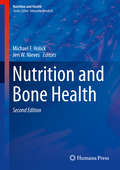- Table View
- List View
Nutrition For Life
by Janice Thompson Melinda ManoreNutrition for Life capitalizes on students’ natural interest in nutrition by demonstrating how it relates directly to their health and daily lives. This book is unique among introductory texts in its presentation of nutrients based on function, rather than chemical classification. Within the vitamins and minerals chapters, micronutrients are organized by their various functions within the body (such as tissue guardians, antioxidants, energy generators, essential electrolytes, mineral power plants, blood fortifiers, bone builders), enabling students to think about them conceptually while also understanding their basic roles in the body. This discourages rote memorization and promotes fuller and more accessible understanding of each micronutrients’ importance. For those instructors who still want their students to understand the traditional chemical organization, the micronutrient chapters include detailed tables and overviews of water-soluble and fat-soluble vitamins, and the trace and major minerals. <p><p> Beyond the functional approach, Nutrition for Life includes applied features such as Eating Right All Day, Foods You Don’t Know You Love Yet, and new Cooking videos. The Third Edition also includes additional content with engaging new features, fewer Nutri-Cases, and the new MyPlate food patterns and recommendations. The art and photos have also been updated, along with a fresh interior design.
Nutrition For Life: The No-Fad, No-Nonsense Approach to Eating Well and Reaching Your Healthy Weight
by Darwin Deen Lisa HarkA physician and a nutritionist team up to provide readers with up-to-date, sound advice on healthful eating and weight loss. This bible of good nutrition features a user-friendly split-page format and contains recipes, sample menus, and nutrition and food facts.
Nutrition Guide for Clinicians (2nd edition)
by Neal D. Barnard Rick WeissingerA detailed catalog of medical conditions and dietary recommendations.
Nutrition Guide for Physicians
by Maria Boyle Struble Norman J. Temple George A. Bray Ted WilsonNutrition Guide for Physicians is a desktop reference guide on nutrition and its clinical implications for health and disease through the lifecycle. Presented in a new softcover format and user-friendly style, it serves as a valuable resource of practical information on nutrition for physicians in their daily practice. Nutrition Guide for Physicians is divided into three parts that cross the spectrum of nutritional concerns for improving the practice of medicine. Part One provides basic nutritional principles for physicians. Part Two covers nutrition through the lifecycle and optimal nutrition patterns through all stages of development. Part Three covers diet and its role in prevention, cause and treatment of disease. All chapters include figures and tables that provide useful descriptive and visual reviews. "Key points" and succinct "conclusions" are also provided for each topic. Nutrition Guide for Physicians provides a wide perspective of the impact that nutrition has upon medical practice and will be am indispensable resource for primary care physicians and other medical professionals.
Nutrition Guide for Physicians and Related Healthcare Professionals
by Norman J. Temple George A. Bray Ted WilsonThis second edition volume is a desktop reference guide on nutrition and its clinical implications for health and disease. Presented in a new softcover format and user-friendly style, it serves as a valuable resource of practical information on nutrition for physicians and other healthcare professionals in their daily practice. The book covers all important aspects of nutrition including basic nutritional principles, nutrition through the lifecycle and optimal nutrition patterns through all stages of development, and diet and its role in prevention, cause, and treatment of disease. Nutrition Guide for Physicians and Related Healthcare Professionals is thoroughly updated from its predecessor, Nutrition Guide for Physicians and provides a wide perspective of the impact that nutrition has upon medical practice and will be an indispensable resource for primary care physicians and other medical professionals.
Nutrition Guide for Physicians and Related Healthcare Professions (Nutrition and Health)
by Norman J. Temple George A. Bray Ted WilsonThis fully updated and expanded third edition is a reference guide on nutrition and its clinical implications for health and disease through the life-cycle. The book endeavors to address the needs of those who would most benefit from up-to-date information on recent advances in the field of nutrition. Written by experts in the field, chapters cover a diverse range of nutritional areas that present a succinct overview of recent thinking and discoveries that have the greatest capacity to aid physicians and other healthcare professionals in improving the nutritional health of their clients. The text is divided into eight parts. Part one and two address the nutrient requirements and special nutrition-related issues for people across all stages of the lifespan—from pregnancy and infancy through the adolescent years to the older adult years. Part three summarizes the role of nutrition in the prevention and management of chronic conditions frequently seen in clinical practice, including obesity, diabetes, bone disorders, coronary heart disease, hypertension, and cancer. Part four describes different dietary patterns (the Mediterranean diet, the DASH diet, the vegetarian diet, and the ketogenic diet). Part five describes nutrition challenges specific to surgery and several different acute diseases and disorders (gastrointestinal disorders, food allergy and intolerance, diseases of the liver and pancreas, kidney disease, eating disorders, bariatric surgery, sarcopenia, and drug interactions with food). Part six looks at different aspects of the diet (coffee, tea, dietary fat, dietary sugars, energy drinks, alcohol, dietary fiber, vitamins, minerals, and the gut microbiome). Part seven examines a range of factors that influence dietary health decisions (creating nutritional behavior change, methods for assessing nutritional status, Dietary Reference Intakes, an overview of the diet and food guides, food labels, and sources of nutrients). Finally, part eight looks at dietary supplements (including the problem of dishonest marketing) and false and misleading information in the area of nutrition. The growing nutritional impact of COVID-19 is discussed throughout the book where appropriate.Nutrition Guide for Physicians and Related Healthcare Professions Third Edition serves as a comprehensive guide that is organized by age/lifespan, nutrition therapy in relation to chronic disease and COVID, diet and its role in prevention, dietary requirements and recommendations, and influencing health decisions for the patient. It is a valuable resource of practical and easy-to-access information on nutrition for physicians, nurses, pharmacists, and others in their daily practice.
Nutrition Now (Seventh Edition)
by Judith E. BrownNUTRITION NOW introduces non-major students to the science of nutrition while engaging them through active learning exercises and applied, real-world examples. This text's unique modular format (33 units) helps students focus on critical content by organizing the material into smaller sections and provides instructors the flexibility to choose which units to cover and modify the order to meet course goals and objectives. This evidence-based text uses a direct, student-friendly writing style that makes content approachable, but not oversimplified. The emphasis on active learning and critical thinking allows instructors to design an interactive environment regardless of class size or format (in classroom or online). NUTRITION NOW offers a flexible option to meet your course needs that will get your students excited about the science of nutrition.
Nutrition Research Methodologies
by Susan A. Lanham-New Julie A. Lovegrove Leanne Hodson Sangita SharmaA new book in the acclaimed Nutrition Society Textbook Series, Nutrition Research Methodologies addresses the rapidly advancing field of nutrition research. It covers the diverse methodologies required for robust nutritional research to ensure thorough understanding of key concepts, both for students at undergraduate and postgraduate levels and for scientists working in nutrition research.Combining theory with practical application, Nutrition Research Methodologies addresses both traditional research methods and new technologies, and focuses on a range of complex topics, including energy compensation, nutrient-gene interactions and metabolic adaptation. It also considers statistical issues as well as application of data to policy development.Provides the reader with the required scientific basics of nutrition research in the context of a systems and health approachWritten specifically to meet the needs of individuals involved in nutrition researchCombines the viewpoints of world-leading nutrition experts from academia and research with practical applicationsAccompanied by a companion website with a range of self-assessment material (www.wiley.com/go/lovegrove/nutritionresearch)
Nutrition Research: Concepts and Applications
by Karen Eich Drummond Alison Reyes Natalie K. Cooke Virginia C. StageNutrition Research: Concepts and Applications, Second Edition assists students in developing the skills necessary to become knowledgeable consumers of research, conduct and document research projects, and using research findings in the classroom and in supervised practice. The Second Edition makes research articles approachable and understandable so students can feel confident reading and interpreting not just primary research, but also narrative and systematic reviews. In turn, this text also helps students understand and access practice guidelines to enable their participation in evidence-based nutrition and dietetics practice.Nutrition Research, Second Edition provides numerous examples of concepts, ample practice opportunities using questions tied to actual studies, and occasions for step-by-step mastery of concepts. This valuable text starts with the basics and is comprehensive in its approach, making it ideal for undergraduate students as well as graduate students. Includes clear guideline for many research activities, such as evaluating articles and the various steps in the research process.Features a NEW chapter on disseminating research based on the intended audience, covering oral presentations, poster presentations, publications, and blogs.Highlights premier sources of evidence in nutrition research, such as the Evidence Analysis Library and the Academy of Nutrition and Dietetics.Discusses the varied types of literature reviews, empowering students to synthesize the literature. Features a chapter devoted to obtaining funding for research and programs. © 2023 | 450 pages
Nutrition Scoreboard
by Michael JacobsonThis book provides information on eating right and staying healthy by rating various foods.
Nutrition Security for Planetary Health
by Irana HawkinsUsing the lens of nutrition security and equity for the living beings and living systems of the planet, Nutrition Security for Planetary Health takes an integrated, systems approach that not only delineates the antecedents of the multifaceted environmental crises—but offers solutions including the extensive co-benefits of whole plant foods nutrition as the foundational dietary pattern for improving planetary health. Overlooked yet inseparable problems that connect food systems to the transgression of our planetary boundaries, chronic disease, and zoonotic disease are discerned. Bolstering nature and biodiversity is emphasized throughout including regenerative agroecology, native plant foods and ecosystems, utilizing traditional and Indigenous wisdom, rewilding, and community science. Lastly, inspiring vignettes demonstrate the power of individual and collective actions that advance planetary health.
Nutrition Standards and Meal Requirements for National School Lunch and Breakfast Programs: Phase I. Proposed Approach for Recommending Revisions
by Institute of Medicine of the National AcademiesThe National School Breakfast Program feeds 10 million children each day, and the National School Lunch Program feeds more than 30 million students. Yet the national nutrition standards and meal requirements for these meals were created more than a decade ago, making them out of step with recent guidance about children's diets. With so many children receiving as much as 50 percent of their daily caloric intake from school meals, it is vital for schools to provide nutritious food alongside the best possible education for the success of their students. At the request of U.S. Department of Agriculture (USDA), the Institute of Medicine assembled a committee to recommend updates and revisions to the school lunch and breakfast programs. The first part of the committee's work is reflected in the December 2008 IOM report Nutrition Standards and Meal Requirements for National School Lunch and Breakfast Programs: Phase I. Proposed Approach for Recommending Revisions. Phase II of the report is expected in Fall 2009. This first report provides information about the committee's approach as it reviews the school lunch and breakfast programs. In the report's second part, the committee will share its findings and recommendations to bring these meals more in line with today's dietary guidelines. The committee welcomes public comments about its intended approach. An open forum will be held January 28, 2009 in Washington, DC to receive input from the public. Please go to http://www.iom.edu/fnb/schoolmeals for details or email FNBSchoolMeals@nas.edu with any input.
Nutrition Stripped: 100 Whole Food Recipes Made Deliciously Simple
by McKel HillDiscover just how deliciously simple whole foods cooking can be with this essential cookbook, based on the popular Nutrition Stripped blog, featuring more than 100 exciting and good-for-you recipes and color photography throughout.Search the web and you’ll find a variety of recipes from “health food” bloggers and “nutritionists.” Yet many of these recipes often follow trends or fad diets. Now, McKel Hill, a Registered Dietitian Nutritionist and wellness coach, takes you back to bare basics to enjoy the amazing benefits and incomparable flavor of whole foods—nature’s true healthy bounty.Drawing inspiration from nature, the turning of the seasons, the world of plants, nutrient dense foods and hidden gems in the world of superfoods, Hill celebrates simplicity, and shares her vast professional knowledge and expertise in this practical and easy-to-use cookbook. But Nutrition Stripped isn’t just an approach to eating—it’s a lifestyle that will help you look, feel, and be your best. Whole foods cooking is the foundation of health and can be enjoyed no matter what your dietary preference, whether it's vegan, paleo, or gluten-free.Hill’s whole food, plant-based recipes are gluten-free, dairy-free, and entirely free from processed food, yet all can be adapted to specific tastes and needs, making them realistic, approachable, global, and livable. Start your day with delights such as Turmeric Milk (the new green smoothie), Carrot Cake Quinoa Porridge, or Plantain Flatbread with Poached Egg and Honey. For dinner, feast on Beetroot Burgers with Maple Mustard or Carrot Gnocchi with Carrot Greens Pesto. And don’t forget dessert—indulge with a mouthwatering slice of Raw Peach Tart with Coconut Whipped Cream or some Salted Caramel Brownies.Illustrated with beautiful, modern and minimalistic color photographs, Nutrition Stripped shows you how delicious and simple it can be to eat healthier with whole foods.
Nutrition Support for the Critically Ill
by III David S. Seres Charles W. Van WayThis text provides a review of the current knowledge in both the mechanics of nourishing the critically ill and the metabolic and immunological roles nutrients play. In-depth chapters discuss disease-related malnutrition as distinct from under-or-over nourishment and the impact of nourishment in either form of malnutrition. The appropriate timing and indications for nutrition support are provided as well as advanced techniques for improving practice. A broad range of issues related to interdisciplinary practice are addressed. Useful for a wide variety of practitioners, including ICU doctors, hospitalists, and nutrition support physicians, Nutrition Support of the Critically Ill provides practical bedside advice and simplified recommendations for practice.
Nutrition Support for the Critically Ill Patient: A Guide to Practice, Second Edition
by Gail A. CresciCompletely revised and updated, Nutrition Support for the Critically Ill Patient: A Guide to Practice, Second Edition presents an unbiased, evidence-based examination of critical nutrition across the life cycle. Taking a multidisciplinary approach, each chapter has been carefully designed to provide a comprehensive review of the literature and a de
Nutrition Support to Elderly Women: Influence on Diet Quality (Garland Studies on the Elderly in America)
by Michell PierceFirst published in 2000. Routledge is an imprint of Taylor & Francis, an informa company.
Nutrition Therapy And Pathophysiology
by Marcia Nelms Kathryn SucherA practical all-in-one resource for students, clinicians and researchers, NUTRITION THERAPY AND PATHOPHYSIOLOGY, 4th Edition, delivers a comprehensive review of disease pathophysiology and treatment that reflects the latest research, evidence-based practice guidelines, and scope and standards of dietetics practice. It clearly connects nutrition therapy practices and expected outcomes to underlying disease processes at every level--from cells to organ systems. Detailed illustrations enhance your understanding of disease progression, surgical procedures and treatment protocols, while end-of-chapter tables describing complementary and alternative therapies provide a quick-reference resource. In addition Practitioner Interviews provide insight for working with patients in real-world practice.
Nutrition Therapy for Chronic Kidney Disease
by Lynn K. Thomas Jennifer Bohnstadt OthersenKidney disease is a global health concern that affects people of all ages and races. Based on the work of the National Kidney Foundation and the Kidney Disease: Improving Global Outcomes foundation, guidelines have been developed outlining the parameters for patient care. Nutritional Therapy for Chronic Kidney Disease builds upon the discoveries ma
Nutrition Twins' Veggie Cure: Expert Advice And Tantalizing Recipes For Health, Energy, And Beauty
by Lyssie Lakatos Tammy ShamesGet started on the path to a happier and healthier and more energetic you! In this book the Nutrition Twins, both registered dietitian nutritionists, reveal which vegetables help specific health and beauty problems, and provide more than 100 delicious and nutritious recipes to put this "cure" into action on your plate. Each chapter starts with a goal--more energy, stronger bones, younger-looking skin, improved mood, flatter stomach, etc. In clear, conversational language the authors lay out what veggies will help you to succeed in reaching your goal, why they work, and how to reap their benefits via the delicious recipes available just pages away. With the advent of the USDA&’s new plate graphic (half the plate being fruits and vegetables) supplanting the tired old pyramid, everyone is being urged to eat substantially more vegetables. With this accessible book, readers will be motivated to tailor their menus to their own needs, while at the same time discovering a variety of delicious, easy veggie recipes that their whole family will enjoy--and benefit from. Includes an easy-to-follow menu plan for a 10-day Jumpstart to Health and Weight Loss.
Nutrition and AIDS (Modern Nutrition)
by Ronald R. WatsonEvidence shows that nutritional supports can help maintain health in the HIV-infected patient by replacing lost nutrients, compensating for nutritional damage done by the retrovirus-induced immunodeficiency, and stimulating the remaining immune system and cells for better host defenses.This new edition of Nutrition and AIDS is a timely look
Nutrition and Alcohol: Linking Nutrient Interactions and Dietary Intake
by Victor R. Preedy Ronald Ross WatsonOver the past decade, much has been learned about the damaging effects that moderate to severe alcohol use has on tissue nutrient levels and dietary intake. In addition to alcohol's potential to damage every organ in the body, alcohol abuse or heavy use causes poorer dietary intake and provides a greater risk of alcohol's damage while increasing th
Nutrition and Bariatric Surgery
by Robert F. Kushner Christopher D. StillBariatric surgery has led to improved health outcomes including significant weight loss and reduction in co-morbidities among patients with obesity. Clinical practice guidelines recommend that patients considering bariatric surgery undergo a comprehensive nutritional assessment. Nutrition and Bariatric Surgery is the first comprehensive book that u
Nutrition and Behavior
by John Worobey Beverly Tepper Robin KanarekDespite their widespread coverage in the media, there is little emphasis on nutrition in books in psychology, and most textbooks in nutrition barely acknowledge the behavioral correlates of nutrient status. This book will provide interested readers in the fields of nutrition and psychology with information on how these two areas of current research interface. Traditional topics (e.g., micronutrients, sugar, eating disorders) are addressed, as well as the newest topics (e.g., herbs, PUFAs, obesity). Critically reviewed are research methods and results that demonstrate the utility of considering both perspectives when designing studies to explore human behavior.
Nutrition and Behavior: A Multidisciplinary Approach
by John Worobey Beverly Tepper Robin B KanarekThe relationship between nutrition and behaviour is bi-directional in nature, with nutritional factors able to affect activity and disposition, and behavior impacting diet and food intake. This book reviews these links, starting with their complex neurobiological basis, such as in the case of folate deficiency and cognitive decline. It also illustrates how behaviour may determine nutritional choices or status through peer modelling and poor dietary habits. Micronutrients and eating disorders are then critically addressed, with a review of current research methods and results, before extra-nutritional influencers on behaviour such as caffeine, herbal supplements and alcohol are discussed in the final section.
Nutrition and Bone Health
by Michael F. Holick Jeri W. NievesThis newly revised edition contains updated versions of all of the topics that were in the first edition and has been substantially expanded with an additional 5 chapters. Each chapter includes information from the most up-to-date research on how nutritional factors can affect bone health, written with an evidence-based focus and complete with comprehensive references for each subject. Nutrition and Bone Health, second edition covers all aspects of nutrition and the skeleton, from the history and fundamentals, to the effects of macronutrients, minerals, vitamins, and supplements, and even covers the effects of lifestyle, the different life stages, and nutrition-related disorders and secondary osteoporosis. New chapters include HIV & AIDs and the skeleton, celiac disease and bone health, and nutrition and bone health in space. Nutrition and Bone Health, second edition is a necessary resource for health care professionals, medical students, graduate students, dietitians, and nutritionists who are interested in how nutrition affects bone health during all stages of life.
